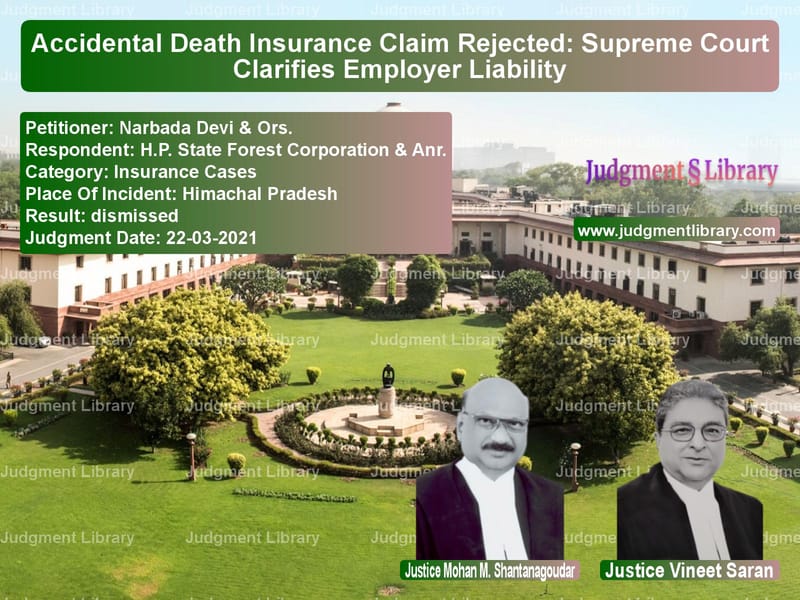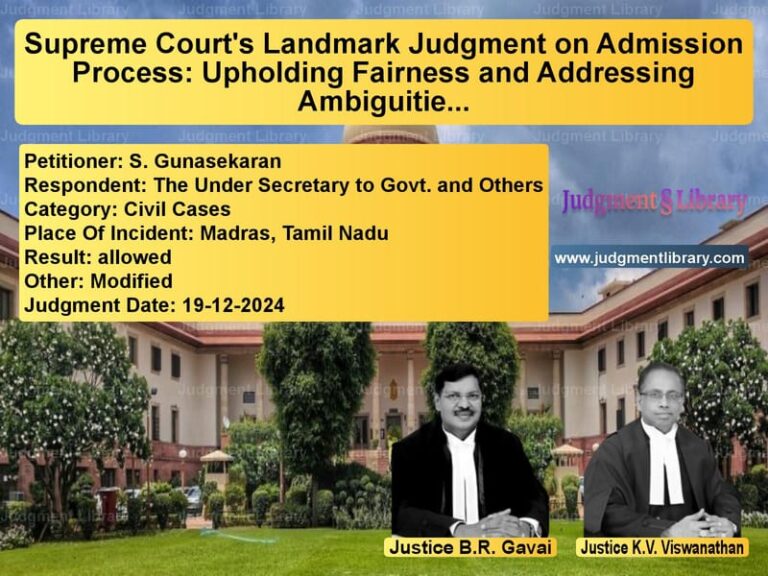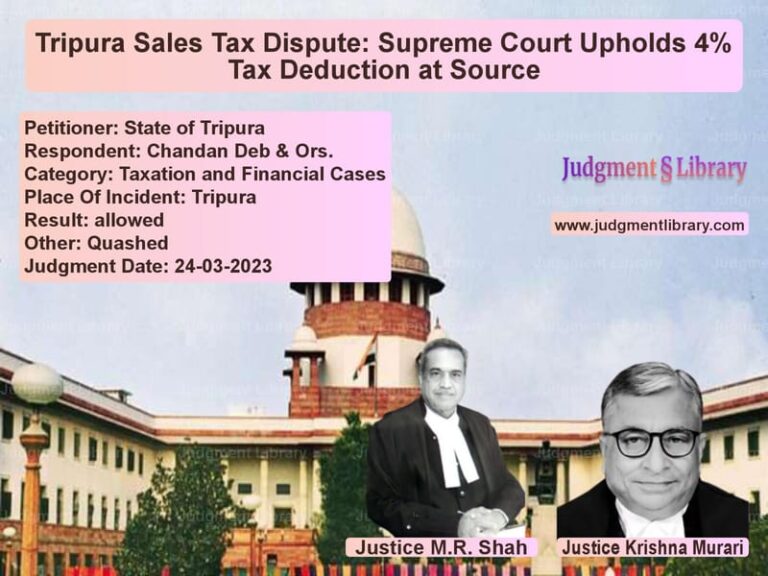Accidental Death Insurance Claim Rejected: Supreme Court Clarifies Employer Liability
The case of Narbada Devi & Ors. vs. H.P. State Forest Corporation & Anr. is a crucial ruling by the Supreme Court of India regarding the applicability of insurance claims under personal accident policies and employer liabilities. This case originated from the unfortunate death of an employee while he was on duty, raising legal questions on whether his death was accidental or natural and if the insurance company or employer could be held liable for compensation.
The judgment is significant as it addresses:
- Interpretation of the Janta Personal Accident Insurance Policy.
- Liabilities of an employer under insurance schemes and workmen’s compensation laws.
- The role of consumer forums in adjudicating insurance disputes.
Background of the Case
The deceased, Om Prakash, was employed as a daily-wage Chowkidar by the Himachal Pradesh State Forest Corporation (HPSFC). On the night of 7th October 1997, while returning from Banal Depot to Thundal, he encountered heavy rain and a storm. The next morning, he was found in a weak state, smelling of alcohol. Despite efforts to revive him with a hot water bath and massage, he passed away on 8th October 1997.
The post-mortem report stated that:
- There were no injuries on his body.
- The cause of death was asphyxia due to regurgitation of food into the larynx and trachea.
- The chemical examiner’s report revealed 34.5 mg of alcohol per 100 ml of urine, indicating alcohol consumption.
Under the Janta Personal Accident Insurance Scheme, HPSFC had insured its employees, including the deceased, for Rs. 1 lakh each. The deceased’s family filed a claim, which was rejected by the New India Assurance Company on the grounds that the death was not accidental.
Legal Issues Raised
1. Was the Death Accidental Under the Insurance Policy?
The primary issue was whether the death of Om Prakash could be classified as “accidental” under the insurance terms. The insurance policy covered only bodily injuries resulting from external, violent, and visible means. The insurer argued that the death was due to natural causes and alcohol ingestion, not an accident.
2. Employer’s Liability for Compensation
The deceased’s legal heirs contended that HPSFC was responsible for ensuring benefits under the insurance scheme and sought compensation either from the insurer or the employer.
3. Jurisdiction of Consumer Forums
The case went through multiple consumer forums:
- The District Consumer Disputes Redressal Forum ruled in favor of the deceased’s family, ordering the insurance company to pay Rs. 2 lakhs.
- The State Commission reversed the decision, holding HPSFC liable instead.
- The National Commission further ruled that neither the insurer nor HPSFC was liable under the insurance policy.
Supreme Court’s Observations
The Supreme Court reviewed the evidence, including expert opinions, and made the following key observations:
- The policy explicitly covered only deaths caused by outward, violent, and visible means.
- The post-mortem report and expert opinions showed no external injuries, ruling out an accidental death.
- The deceased’s blood alcohol level suggested intoxication, and the policy contained an exclusion clause for deaths occurring under the influence of alcohol.
- HPSFC was only an intermediary that facilitated insurance premiums and was not liable for claims under the policy.
Final Verdict
The Supreme Court upheld the ruling of the National Commission and dismissed the appeal, stating:
- The insurance company was not liable to pay compensation as the death was not accidental.
- HPSFC had no liability under the insurance scheme since it was merely a facilitator of premiums.
- Claims under workmen’s compensation laws should be pursued separately.
Implications of the Judgment
This ruling has important implications for insurance claims and employer liabilities:
- Strict Interpretation of Insurance Policies: Only claims meeting explicit policy terms will be honored.
- Exclusion Clauses Are Binding: Death under the influence of alcohol voided the insurance claim.
- Limited Employer Liability: Employers acting as intermediaries for insurance schemes are not automatically liable for compensation.
- Consumer Forums’ Role: Insurance disputes must be carefully analyzed within the policy’s framework before ruling on liability.
By reinforcing the principle that insurance claims must adhere strictly to policy terms, the Supreme Court has provided clarity on the legal obligations of insurers and employers in accident-related compensation claims.
Petitioner Name: Narbada Devi & Ors..Respondent Name: H.P. State Forest Corporation & Anr..Judgment By: Justice Mohan M. Shantanagoudar, Justice Vineet Saran.Place Of Incident: Himachal Pradesh.Judgment Date: 22-03-2021.
Don’t miss out on the full details! Download the complete judgment in PDF format below and gain valuable insights instantly!
Download Judgment: narbada-devi-&-ors.-vs-h.p.-state-forest-co-supreme-court-of-india-judgment-dated-22-03-2021.pdf
Directly Download Judgment: Directly download this Judgment
See all petitions in Health Insurance Disputes
See all petitions in Life Insurance Claims
See all petitions in Other Insurance Cases
See all petitions in Judgment by Mohan M. Shantanagoudar
See all petitions in Judgment by Vineet Saran
See all petitions in dismissed
See all petitions in supreme court of India judgments March 2021
See all petitions in 2021 judgments
See all posts in Insurance Cases Category
See all allowed petitions in Insurance Cases Category
See all Dismissed petitions in Insurance Cases Category
See all partially allowed petitions in Insurance Cases Category







